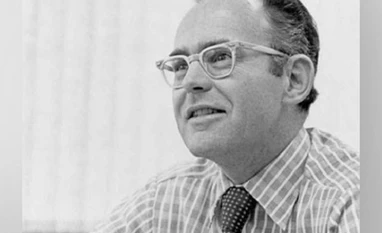Gordon Moore, the co-founder of Intel, passed away on Saturday at 94. In a press release, the tech firm said he was surrounded by family at his home in Hawaii and died peacefully. They did not provide a cause.
Credited for coming up with the "Moore's Law" that would shape the entire semiconductor industry for years to come, Moore helped give Silicon Valley its name.
The "accidental entrepreneur" Moore, along with his partner and Intel's co-founder Robert Noyce, can be credited for bringing computers to millions of people across the globe.
"Gordon Moore defined the technology industry through his insight and vision. He was instrumental in revealing the power of transistors, and inspired technologists and entrepreneurs across the decades. We at Intel remain inspired by Moore's Law and intend to pursue it until the periodic table is exhausted," said Pat Gelsinger, chief executive officer (CEO) of Intel on Moore's death.
But, perhaps, the best description came from Andy Bryant, former chairman of Intel's board of directors, who said Moore was a "brilliant scientist, a straight-talker and an astute businessperson who sought to make the world better".
Who was Gordon Moore?
Known to many as the co-founder of Intel, Moore's story began much earlier. Moore was born in 1929 in San Francisco. After graduating from San Jose State University, Moore went to Caltech and received his doctorate in chemistry in 1954.
He started his career as a manager at Dow Chemical. Soon, he started working at the Applied Physics Laboratory at John Hopkins University in Maryland.
It was in 1956 that Moore's tryst with transistors and semiconductors began. He joined William Shockley to work at a West Coast division of Bell Laboratories. Shockley invented the transistor, and Bell Labs wanted to make cheap silicon transistors.
But Shockley, however good a scientist he may be, was a not-so-good businessman. Shockley Semiconductor, as the division was called, foundered.
In 1957, Moore, Noyce and six others left Bell Labs and formed the Fairchild Semiconductor Corporation. The "traitorous eight" became pioneers in manufacturing integrated circuits or semiconductors chips, as we call them today.
Birth of Intel and the personal computer revolution
In 1968, Moore and Noyce decided to form their own company. With $2.5 million in capital, they founded Integrated Electronics Corporation, which we now know as Intel.
To improve the transistor's speed and density, they decided to use silicon to make the chips and not aluminium. They were also joined by Andy Grove, a young Hungarian who would later succeed Moore to head Intel.
The company changed how computers were used, making them affordable and bringing them home to millions. Even today, Intel is the biggest maker of processor chips in the world.
Moore became the chairman and CEO of the company in 1979. He stepped down as CEO in 1987 but remained chairman until 1997.
What is Moore's Law?
Before founding Intel sometime in 1965, Moore observed that due to technological improvements, the number of transistors on microchips had doubled every year since the chips were invented. He predicted that the trend would continue in years to come.
Although he later amended the law and changed the time to two years, "Moore's Law" pushed Intel and its rivals to aggressively target their resources and devise ways to meet the thumb rule. The semiconductor industry's breakneck speed of development has long been credited to Moore's Law.
The law also had two corollaries. One, the evolving technology would make computers costlier to produce. Second, consumers would still get them for cheaper prices because so many PCs would be sold.
In recent years, Intel rivals such as Nvidia have contended that Moore's Law no longer holds as improvements in chip manufacturing have slowed down.
But Intel's current CEO's statement today shows that the company still believes the law holds.
Gordon Moore's later years
After retiring from Intel in 2006, Moore served as chairman of the board for the Gordon and Betty Moore Foundation until transitioning to chairman emeritus in 2018. Moore also served as a member of the board of directors of Conservation International and Gilead Sciences.
He was a member of the National Academy of Engineering, a Fellow of the Royal Society of Engineers, and a Fellow of the Institute of Electrical and Electronics Engineers. He served as chairman of the board of trustees of the California Institute of Technology from 1995 until the beginning of 2001 and continued as a Life Trustee.
Moore received the National Medal of Technology from then-US president George HW Bush in 1990. In 2002, he got the Presidential Medal of Freedom, the highest civilian honour in the US, from George W Bush.
Unlock 30+ premium stories daily hand-picked by our editors, across devices on browser and app.
Pick your 5 favourite companies, get a daily email with all news updates on them.
Full access to our intuitive epaper - clip, save, share articles from any device; newspaper archives from 2006.
Preferential invites to Business Standard events.
Curated newsletters on markets, personal finance, policy & politics, start-ups, technology, and more.
)